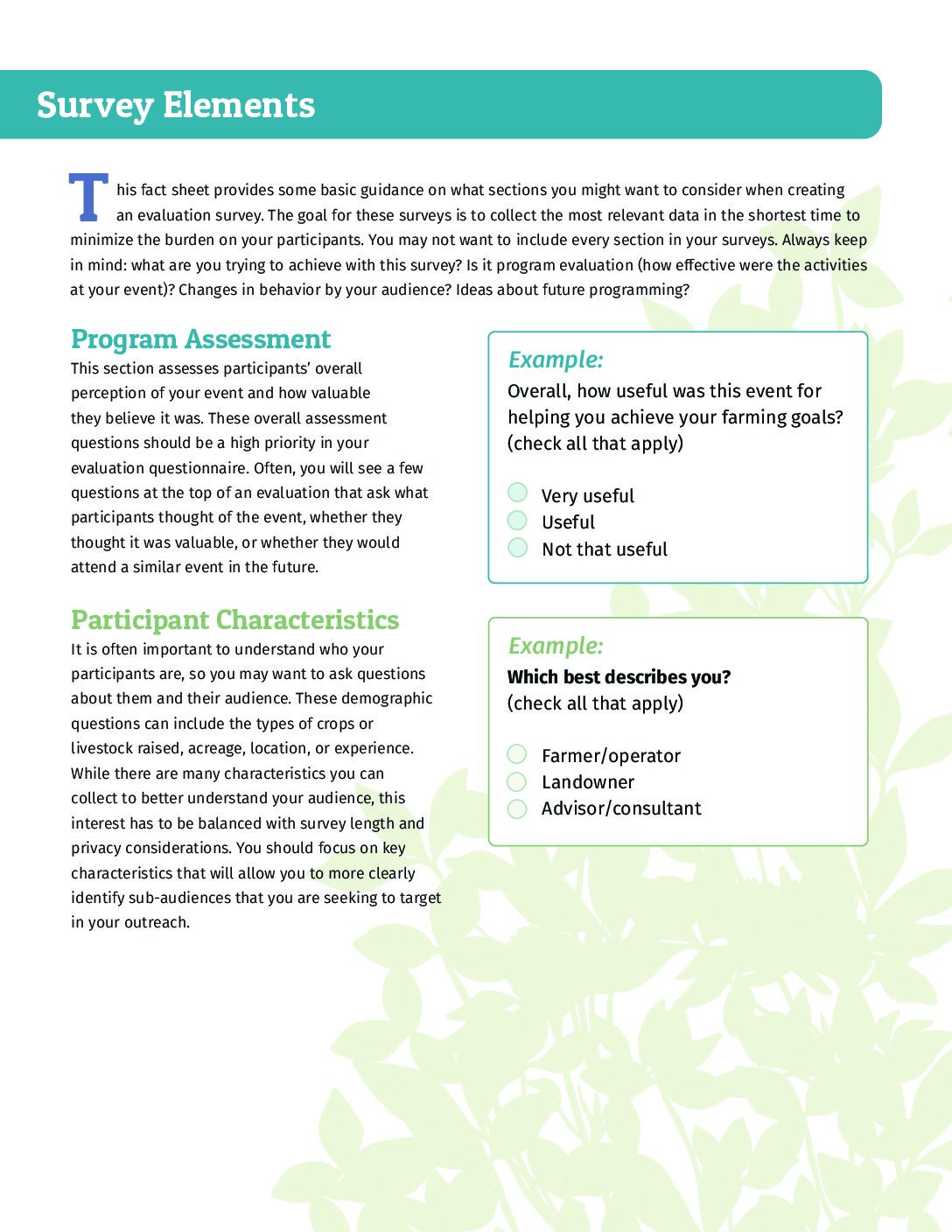This page provides some basic guidance on what sections you might want to consider when creating an evaluation survey. The goal for these surveys is to collect the most relevant data in the shortest time to minimize the burden on your participants.
You may not want to include every section in your surveys. Always keep in mind: what are you trying to achieve with this survey? Is it program evaluation (how effective were the activities at your event)? Changes in behavior by your audience? Ideas about future programming?
Program Assessment
This section assesses participants’ overall perception of your event and how valuable they believe it was. These overall assessment questions should be a high priority in your evaluation questionnaire. Often, you will see a few questions at the top of an evaluation that ask what participants thought of the event, whether they thought it was valuable, or whether they would attend a similar event in the future.
Example
Overall, how useful was this event for helping you achieve your farming goals?
(check all that apply)
- Very useful
- Useful
- Not that useful
Participant Characteristics
It is often important to understand who your participants are, so you may want to ask questions about them and their audience. These demographic questions can include the types of crops or livestock raised, acreage, location, or experience. While there are many characteristics you can collect to better understand your audience, this interest has to be balanced with survey length and privacy considerations. You should focus on key characteristics that will allow you to more clearly identify sub-audiences that you are seeking to target in your outreach.
Example
Which best describes you?
(check all that apply)
- Farmer/operator
- Landowner
- Advisor/consultant
Current Practices
As part of understanding your audience, you likely want to ask about their current use of conservation or other production practices. You can ask these in a ‘check all that apply’ question that lists practices, detailed questions about certain practices you may be interested in, or an open-ended format that allows participants to use their own words about their current practices.
You may also want to include questions about how long they have used these practices or their perceptions of how beneficial these practices have been.
Example
What types of practices are you currently doing on your farm? (Check all that apply)
- No till/ strip till
- Rotational grazing
- Nutrient management
- Cover crops
- Extended crop rotation
- No conservation practices
Awareness, Knowledge, and Attitude Changes
You have certain goals and expected outcomes that you are trying to achieve with your outreach events. Asking participants what they learned or what perceptions changed as a result of your event serves as an important data point. Again, it is important to balance survey length so focus on asking a small number (1-5) of clear and concise questions that focus on key outcomes for that particular event.
Example
I am aware of neighbors and other farmers in my area using cover crops.
- Agree
- Neutral
- Disagree
Anticipated Changes
You may also be aiming to see changes in practice use, whether adoption of new practices or increase in intensity or complexity of the practice. As with knowledge, awareness, and attitude changes, it is important to focus on the key anticipated outcomes for that particular event.
You may want to ask whether participants anticipate adopting new practices, increasing or changing the number of acres in a practice, or other changes to production systems. You should also consider other changes that can indicate the producer is willing to make changes in the future, including seeking out new information, exploring cost-share programs, or engaging in other programs. It is important to recognize that these questions indicate participant intentions to change behavior; a lot of factors can interfere with good intentions, so take these anticipated changes for what they are.
Example
What changes do you anticipate making as a result of today’s event?
- I plan to begin use of cover crops this next year
- I plan to seek information about conservation cost share programs
- I do not plan to make any changes
 Download: elements of evaluation surveys
Download: elements of evaluation surveys

